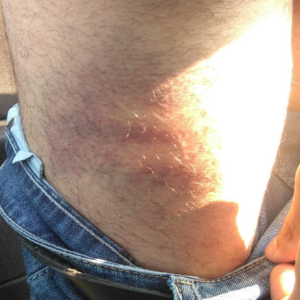The respondent and his two friends traveled by foot from Velika Kladuša (BIH) to Croatia. After they crossed the border to Croatia, they walked for 30 km in about six hours. At some point, while they crossed a forest, they were detected by six Croatian officers in dark blue uniforms.
“We were in the jungle and could hear police coming. They shoot three, four times. When they caught me, they broke my phone and three power banks.”
When the officers arrived, they broke the respondent’s phone and the three power banks of the group. They then asked the three of them about their nationality but didn’t ask any further questions. The respondent tried to explain to the officers that he wanted to stay in Croatia and seek asylum, but they refused his request without any formal investigation of his case and access to the asylum procedure:
“I said to them [police] that I wanted to stay [in Croatia]. They said: “No, no, no. It does not have space for you, go back. I don’t have camp here, here it is full, it is full”, this is what police said to me.”
Then all of them were taken with a police van straight to the Bosnian border which took around one hour. In the van, they met six other male people on the move who had been caught previously. The journey to the border was difficult for them because the van did not have any windows and was a lacking oxygen:
“The oxygen was not good, the person from Morocco was not feeling really well. The car was driving very fast.”
The van stopped in a remote area close to the official border check point in Maljevac (HRV), next to a steep hill and a small river. When they arrived, the police officers took all personal belongings, except the bags themselves, from them and destroyed them. While some officers were taking their belongings, one officer refused to participate and decided to return them their money that his colleagues wanted to steal:
“At the border, they stole two telephones. I had 1500 Euros. The police wanted to take it, but one person [police officer] was very good and gave me the money back.”
Afterwards, they had to get off the van one by one. Outside, some officers were waiting for them and once they individually exited the car, they all started physically attacking them with batons, shouting at them to go back to Bosnia.
“Three times or four times, they hit me by baton, into my head and they also hit my friend. Five or six times beat me under my back and legs. They could not beat me in the upper part of back because I had my bag on. And after, they pushed me into the river. After, I run away, actually it was hard night, hard night.”
This incident was just another episode of violence in the respondent’s life. He had already attempted to seek asylum in the EU four times and every time was ending with a similar violent push-back from the Croatian authorities back to Bosnia. He also was financially exploited by human smugglers and previously had decided to pay €2300 for a human smuggler to be transported from Bosnia to Italy, but was caught by the police in Slovenia, from where he was deported to Croatia, followed by a violent push-back to Bosnia. Finally, he lost the contact of his smuggler and had spent his money in vain.

